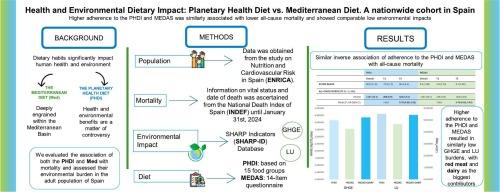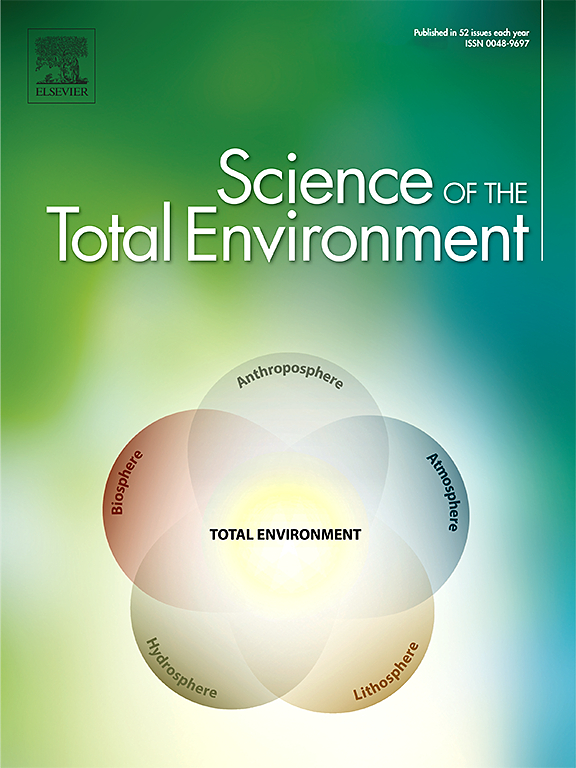饮食对健康和环境的影响:全球健康饮食与地中海饮食。西班牙全国范围内的队列
IF 8
1区 环境科学与生态学
Q1 ENVIRONMENTAL SCIENCES
引用次数: 0
摘要
植物性饮食,如行星健康饮食(PHDI)和地中海饮食(Med),为人类和地球健康提供了显著的优势。然而,关于PHDI益处的知识是有限的,特别是在南欧国家,那里的地中海文化根深蒂固,是一种环境可持续的饮食模式。目的评估西班牙成人PHDI和Med与死亡率的关系,并评估其环境负担。方法数据来自西班牙营养和心血管风险研究(ENRICA),该研究包括13105名代表西班牙成年人的参与者。PHDI评分(0-140分)基于15种食物组,而对Med的依从性是通过14项MEDAS评分(0-14分)来评估的。使用SHARP-ID数据库(包括温室气体排放和土地利用)评估了环境影响。采用Cox回归进行分析,并对主要混杂因素进行校正。结果在平均14.4年的随访期间,发生了1157例全因死亡。PHDI评分最高和最低分位数的死亡率风险比(95% CI)为0.78(0.66,0.91),但在PHDI评分90分时达到平台水平。对于MEDAS,最高和最低分位数的对应结果为0.79(0.68,0.93),呈连续的负剂量反应关系。坚持食用PHDI的某些成分(水果、乳制品和不饱和油)和MEDAS(坚果、低苏打水和糕点的消费)与较低的死亡率独立且显著相关。结果在敏感性分析中仍然是稳健的。就环境影响而言,两种植物性饮食的足迹都很低,乳制品和肉类产品是最大的贡献者。结论:在这个庞大的西班牙成人队列中,较高的PHDI和MEDAS依从性与较低的全因死亡率相似,并且显示出相当低的环境影响。本文章由计算机程序翻译,如有差异,请以英文原文为准。

Health and environmental dietary impact: Planetary health diet vs. Mediterranean diet. A nationwide cohort in Spain
Background
Plant-based diets, such as the Planetary Health Diet (PHDI) and the Mediterranean Diet (Med), offer notable advantages for human and planetary health. However, knowledge on the PHDI's benefits is limited, particularly in Southern European countries where the Med is culturally rooted and is an environmentally sustainable dietary pattern.
Objective
to evaluate the association of both PHDI and Med with mortality and assess their environmental burden in the adult population of Spain.
Methods
Data were taken from the study on Nutrition and Cardiovascular Risk in Spain (ENRICA) comprising 13,105 participants representative of the Spanish adult population. The PHDI score (0–140 points) was based on 15 food groups, while adherence to Med was assessed with the 14-item MEDAS score (0–14 points). Environmental impact was assessed using the SHARP-ID database (including greenhouse gas emissions and land use). Analyses were performed with Cox regression and adjusted for main confounders.
Results
During a mean 14.4-year follow-up, 1157 all-cause deaths occurred. The mortality hazard ratio (95 % CI) for the highest vs lowest tertile of the PHDI score was 0.78 (0.66, 0.91) but reached a plateau level at 90 points of PHDI. For the MEDAS, the corresponding results for the highest vs lowest tertile was 0.79 (0.68, 0.93) with a continuous inverse dose-response association. Adherence to some components of the PHDI (fruits, dairy, and unsaturated oils) and of MEDAS (nuts, and low consumption of soda and pastries) was independently and significantly associated with lower mortality. Results remained robust in sensitivity analyses. In terms of environmental impact, both plant-based diets had similar low footprints, with dairy and meat products being the largest contributors.
Conclusion
In this large cohort of Spanish adults, higher adherence to the PHDI and MEDAS was similarly associated with lower all-cause mortality and showed comparable low environmental impact.
求助全文
通过发布文献求助,成功后即可免费获取论文全文。
去求助
来源期刊

Science of the Total Environment
环境科学-环境科学
CiteScore
17.60
自引率
10.20%
发文量
8726
审稿时长
2.4 months
期刊介绍:
The Science of the Total Environment is an international journal dedicated to scientific research on the environment and its interaction with humanity. It covers a wide range of disciplines and seeks to publish innovative, hypothesis-driven, and impactful research that explores the entire environment, including the atmosphere, lithosphere, hydrosphere, biosphere, and anthroposphere.
The journal's updated Aims & Scope emphasizes the importance of interdisciplinary environmental research with broad impact. Priority is given to studies that advance fundamental understanding and explore the interconnectedness of multiple environmental spheres. Field studies are preferred, while laboratory experiments must demonstrate significant methodological advancements or mechanistic insights with direct relevance to the environment.
 求助内容:
求助内容: 应助结果提醒方式:
应助结果提醒方式:


